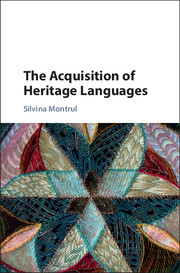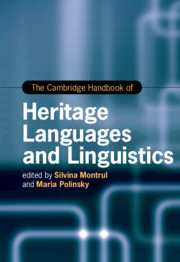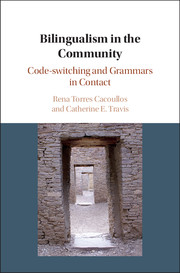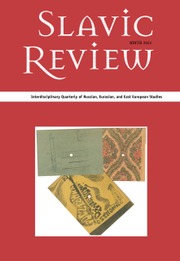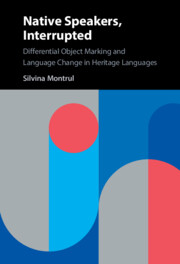
Native Speakers, Interrupted
Differential Object Marking and Language Change in Heritage Languages
$110.00 (F)
- Author: Silvina Montrul, University of Illinois, Urbana-Champaign
- Date Published: December 2022
- availability: Available
- format: Hardback
- isbn: 9781107133372
$
110.00
(F)
Hardback
Other available formats:
eBook
Looking for an examination copy?
This title is not currently available for examination. However, if you are interested in the title for your course we can consider offering an examination copy. To register your interest please contact [email protected] providing details of the course you are teaching.
-
A heritage language is the term given to a language spoken at home by bilingual children of immigrant parents. Written by a leading figure in the field, this pioneering, in-depth study brings together three heritage languages – Hindi, Spanish and Romanian - spoken in the United States. It demonstrates how heritage speakers drive morphosyntactic change when certain environmental characteristics are met, and considers the relationship between social and cognitive factors and timing in language acquisition, bilingualism, and language change. It also discusses the implications of the findings for the language education of heritage speakers in the USA and considers how the heritage language can be maintained in the English-speaking school system. Advancing our understanding of heritage language development and change, this book is essential reading for students and researchers of linguistics and multilingualism, immigration, education studies and language policy, as well as educators and policy makers.
Read more- Brings together three heritage languages in the United States in an in-depth study
- Considers the relationship between social and cognitive factors and timing in language acquisition, bilingualism, and language change
- Weaves discussions and common themes in psycholinguistics, sociolinguistics and historical linguistics, and places heritage speakers at the center of linguistic research to understand natural linguistic processes of language evolution
Reviews & endorsements
‘A valuable resource for scholars interested in syntactic theory, language acquisition, language change, and multilingualism.’ Sarah Hopkyns, Language in Society
Customer reviews
Not yet reviewed
Be the first to review
Review was not posted due to profanity
×Product details
- Date Published: December 2022
- format: Hardback
- isbn: 9781107133372
- length: 280 pages
- dimensions: 235 x 158 x 23 mm
- weight: 0.64kg
- availability: Available
Table of Contents
Preface
Introduction
1. On heritage speakers as native speakers
2. Structural changes in heritage language grammars
3. Differential Object Marking
4. Language change and the acquisition of Differential Object Marking
5. The vulnerability of Differential Object Marking in three heritage languages
6. Differential Object Marking in Spanish as a heritage language
7. Differential Object Marking in Hindi as a heritage language
8. Differential Object Marking and clitic doubling in Romanian as a heritage language
9. Comparing the three heritage languages
10. Intergenerational transmission.
Sorry, this resource is locked
Please register or sign in to request access. If you are having problems accessing these resources please email [email protected]
Register Sign in» Proceed
You are now leaving the Cambridge University Press website. Your eBook purchase and download will be completed by our partner www.ebooks.com. Please see the permission section of the www.ebooks.com catalogue page for details of the print & copy limits on our eBooks.
Continue ×Are you sure you want to delete your account?
This cannot be undone.
Thank you for your feedback which will help us improve our service.
If you requested a response, we will make sure to get back to you shortly.
×
